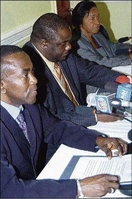Media regulation at its most confusing
Published: Sunday | June 7, 2009

Dr Hopeton Dunn (left), chairman of the Broadcasting Commission; Cordel Green (centre), the commission's executive director; and commissioner Rosemarie Vernon, speak to journalists during a press briefing recently. - file
While reviewing the various documents in which different parties recently offered, or sought to offer, clarification on the issue of Nationwide News Network's (NNN) licensing, it became apparent that a serious flaw exists in the current regulatory structure, wherein the head doesn't know what the tail is doing. Allow me to explain.
Currently, there are four separate regulatory agencies governing broadcast media and telecommunications in Jamaica, each with separate spheres of authority. These are the Broadcasting Commission which has authority over radio, TV and subscriber (cable) TV; the Cinematograph Authority, which has responsibility for the classification and sometimes censorship of film before they are shown in Jamaica; the Office of Utilities Regulations (OUR), which oversees the telecommunications sector along with electricity and water; and the Spectrum Authority, which manages the spectrum and presides over the allocation of broadcast frequencies.
agencies not working as one
What the recent NNN situation revealed was that these agencies were not working in tandem with each other and, in some instances, may be duplicating and confounding the role of another. These dispersed regulatory systems need to be integrated since the current media environment makes separate institutional regulation futile and counterproductive.
Why was the NNN granted provisional broadcasting status without the knowledge of the Broadcasting Commission, whose mandate it is to oversee such operations? Second, why was NNN granted an extension of its initial agreement, given its reported failure to meet basic 'procurement criteria' and Spectrum Management Authority compliance? The 30-day test period is just that, a test, and if failed, then it should be back to the proverbial drawing board!
Another area of confusion for me is the ascription of the term 'public broadcasting' in this case. As mentioned in a press release from the Office of the Prime Minister on the issue, after reviewing the NNN proposal for obtaining a Public Broadcasting agreement with the PBCJ, the National Contracts Commission (NCC), (yet another body; keeping track so far?) advised that NNN's proposal represented an 'economic opportunity.' In democratic societies where a public broad-casting system exists, governing bodies agree that ethically, 'economic opportunity' and public broadcasting do not go hand in hand.
The two are by nature anathema, given that media entities that have a predominant economic incentive are not disposed to cater to civic information. What are the established criteria for obtaining an agreement with the PBCJ? Simple reporting of news is not a sufficient criterion. This news must be different from that received from commercial stations and must have a public information agenda.
What public function does KOOL 97 FM's reassignment to a public broadcasting frequency serve? Before this valuable public good, i.e., the spectrum, is doled out to entities, it must be proven that they are fulfilling a role that is underserved or not served at all in community. Neither NNN nor KOOL represents this, in my humble opinion, based on their current modus operandi.
To conclude, if the Government means to "improve efficiency in the use of the available infrastructure for communication between government and the public", as stated by Information Minister Daryl Vaz in the press release, then getting rid of the chaos that exists in current regulatory framework, which makes it possible for such fiasco as that created by the NNN licence, is the best way forward. One way to do that is to strengthen and clarify the role of the Broadcasting Commission.
One clear authority should be responsible for granting and issuing licences, or at least some collaborative mechanism put in place wherein the SMA, BCJ and other such bodies can work together to ratify applications or requests. While it is the minister of information who grants licences under the Broadcasting and Rediffusion Act, I am assuming that that decision is arrived at through consultation with the various bodies, a process which could be simplified by bringing several of these entities under one umbrella.
Dr Nickesia Gordon is communications professor, Barry University, Florida. She may be reached at nikgord@yahoo.com
